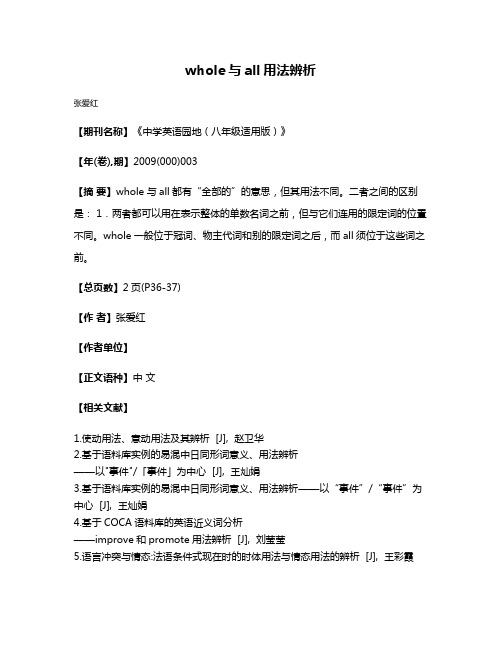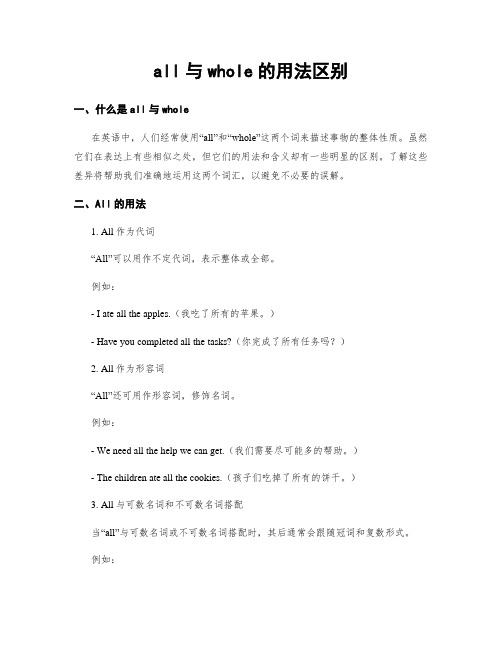all与whole的区别
whole和all的用法及区别

whole和all的用法及区别:这两个词意思相近。
但与限定词和名词连用时,它们的词序各不相同。
有时这两个词大致同义,只是位置不同:all 要放在冠词、指示代词、物主代词等之前,而 whole 应放在这些词之后。
如:“all + 限定词 + 名词”“限定词 + whole + 名词”all the family / the whole family 全家all the time;the whole time 整个时间all my life; my whole life 我的一生all the class;the whole class 整个班级【注意】如名主词前没有限定词,不能用whole,如可以说all day,而不能说whole day。
1)all与 whole都可以和单数名词连用。
例如:①Mary spent all the summer at home.玛丽整个夏天都是在家里度过的。
也可以说成:②Mary spent the whole summer at home.③all my life我的一生=my whole life2)whole与all都可以和单数可数名词连用,但whole更为常见。
例如:④Mary wasted the whole lesson.(较 all the lesson更常见)玛丽把整整一堂课都浪费掉了。
⑤He ate the whole chicken.(较…all the chicken更常见)他把整只鸡都吃掉了。
3)all通常与不可数物质名词连用,而 whole则不能。
在不可数名词之前一般用 all,而不用 whole (偶尔有例外:the whole time / all the time; his whole energy / all hisenergy 等),但在物质名词前则绝对不用 whole。
如:误:the whole money 正:all the money 所有的钱误:the whole food 正:all the food 所有的食物误:the whole wine 正:all the wine 所有的酒⑥正:Jane has drunk all the milk.误:Jane has drunk the whole milk.珍妮喝光了所有的牛奶。
whole和all的用法

whole和all的用法整体和全部的用法一、整体的用法1. 作为形容词使用"整体"是一个表示事物全貌、总体或一切方面的形容词。
它用来描述一个事物的所有部分或成分在某一方面共同构成一个整体。
例如:- The company needs to take a whole new approach to marketing.(公司需要采取全新的市场营销方式。
)- The whole family gathered together for the holiday celebration.(全家人聚集在一起庆祝节日。
)2. 作为名词使用"整体"也可以作为一个名词,指代所有部分组合而成的东西或概念。
例如:- We need to consider the whole of the problem before making a decision.(我们在做决定之前需要考虑问题的全部。
)- The whole of the process was carefully planned and executed.(整个过程都经过了精心计划和执行。
)二、全部的用法1. 作为形容词使用"全部"是指所有可数或不可数事物中的每一个,表示事物中没有任何例外或遗漏。
它常用来描述所有可能相关的人或物,并强调包括了每个个体。
例如:- She ate all the cake by herself.(她一个人吃了整个蛋糕。
)- I have read all the books on this shelf.(我已经把这个书架上的所有书都读过了。
)2. 作为副词使用"全部"也可以作为一个副词,表示完全、整个地或彻底地。
它用来描述动作或状态的程度达到极限。
例如:- The team worked all night to finish the project.(团队通宵工作以完成这个项目。
同义词辨析:total、whole、all、entire

同义词辨析:total、whole、all、entire导航意思: 全部的total:解析: total只作定语,指所有的数目或东西都计算在内的,强调总的数字、数额、数量等。
例句: Her total debts are $800.翻译: 她的全部债务有800美元。
例句: The total shortage was 200 tons.翻译: 短缺总额为两百吨。
whole:解析: whole只作定语,一般只用于修饰单数名词(含集合名词),但前面须有冠词或其他限定词;侧重指某事物的整体,如全部数量、体积、时间等,强调毫无增删、遗漏等。
例句: Dad gave me the whole box of chocolates.翻译: 爸爸把一整盒巧克力都给了我。
例句: The whole village was attacked with influenza.翻译: 全村的人都得了流感。
all:解析: all普通用词,通常用于修饰单数或复数可数名词、不可数名词、物质名词、表示地点的专有名词,应置于冠词、指示代词、物主代词等之前,而 whole 应置于这些词之后。
例句: I want to hear all the details.翻译: 我想听听全部的细节。
例句: All children deserve encouragement.翻译: 所有的孩子都应得到鼓励。
entire:解析: entire较正式用词,只作定语,一般只用于修饰单数名词(包括集合名词),强调团体、时间段、数量等的整体,含不能有所削减或增添之意,用于修饰某一具体事物时常可与 whole 换用。
例句: I am in entire agreement with you.翻译: 我完全同意你的意见。
例句: The entire/whole body of a zebra is marked with black and white stripes.翻译: 斑马的全身都有黑白条纹。
高中不定代词精讲 口诀记忆

one(of)指人或物
one another Ones指人或物 That指物
The weather here is better than that in Shanghai.
①both, either和neither
这三词都可以用来指两个人或两件事物,但各自的意义都不相同:both表示“两个都”、either表示“两个中的任何一个”、neither表示“两者都不……”。它们在句中都分别可以作主语、宾语、和定语,both还可以作同位语,如:
Neither of us could help laughing.
I don’t like the red skirt. Will you please show me another one?
He had his papers in one hand, his hat in the other.
Eight of them are mine, the others are John’s.
如:every other day每隔一天 every three years每隔三年
every third year每隔三年 every other line 每隔一行
every ten miles 每隔十英里
each 后可以接“of ”介词短语,表示“某些人或物中的每一个”,every 后不可以接“of”介词短语,everyone可以直接做主语,后面不跟of,但是every one of的结构十存在的。
用于可数名词 用语不可数名词
whole与all的用法区别

wh l al 用法 区别 oe与 I 的
河 北 徐振芳
一
、 “
这 两个 词 意思相 近 。但 与 限定 词 和名词 连用 时 , 它们 的词 序 各不 相 同 。试 比较 :
a+ l 限定 词+ 词 ” “ l 名 与 限定 词+ h l 名 词 ” wo+ e
1a ) U与 w oe 可 以和 单数 名词 连 用 。例如 : hl都
Ma y s e t al t e 8 l l e t h me= r p n h o e s mme t h me r p n l h u' n r a o . Ma y s e t t e wh l u n r a o .
He h s is e d te wh l f Go e a u tra h oe o n W i h W id =… alo n Wi h W id t te h n. l fGo e t te h n.
语 差 他刚把《 全部看完 。 飘》 之 Id ntU d rtn h h l o a fi 这 件 事情 我并 不 完全 了解 。 o’ n es d tew oe f l o . a /l t 毫 厘 二 、 )hl 1w o e一般 位 于冠 词 、 所有 格 或别 的限 定词 之后 , a 位 于这 些词 之 前 。例 如 : 而 U须
Yo ale e d a wh l a h r . y
(hl 与可数 名词 连 用1你 可 以轻 松地 在 那里呆 上 一整 天 。 wo e多
但 有些 抽象 名词 前也 可 用 w oe h l。例 如 :
3 al 常与不 可数 物质 名 词连 用 , w oe则不 能 。例如 : )l通 而 hl 珍 妮喝 光 了所有 的牛 奶 。
all与whole

all,whole,entire,total1.all着重“整体”,指各个“个体”或各个“部分”组成的“全部的、所有的”整体。
修饰可数名词复数时,指所有的数量;修饰不可数名词时,指整个范围或全部数量。
位于定冠词、指示代词、物主代词、基数词的前面。
如:All that afternoon I jumped and sang and did all kinds of things.All the Chinese people are going all out for the realization of the four modernizations.全中国人民正全力以赴实现四化而奋斗。
常见短语有:all day,all night,all day long,all the morning,all the summer,all the year,all the month;all his books,all these sentences,all the people,all five men,all the students,all(the)horses,all animals;all the news,all the work,all China,all the world,all the city,all his life…注意:①英美人在all day,all night中常不用the。
其它情况下,美国人常不用the。
②all常可与whole互换,但whole位于定冠词,物主代词等之后。
如:all the afternoon the whole afternoonall the year the whole yearall the city the whole cityall the world the whole world③all与地点名词连用指人,whole指人指地区均可。
因此,whole指地区时,不能与all互换。
all与whole的区别

all与whole的区别1.有时这两个词含义大致相同,只是位置不同:all 要放在冠词、指示找词、物主代词等之前,而whole 应放在这些词之后。
如:all the family / the whole family全家2.在复数名词前一般用all,在单数可数名词前一般要用whole。
如:All the children enjoyed themselves. 所有的孩子都过得很快活。
The whole building was burning. 整座在楼都在燃烧。
注:它们在意义上有差别:all指“一个不剩”(即“全部”);whole 指“一点不缺”(即“整个”)。
3.在不可数名词之前一般用all,而不用whole (但偶尔有例外:the whole time / all the time; his whole energy / all his energy等),但在物质名词前是绝对不能用whole 的。
如:误:the whole money正:all the money 所有的钱误:the whole food正:all the food 所有的食物误:the whole wine正:all the wine 所有的酒4.在表地点的专有名词之前, 一般用all 而不用whole 如:all China (全中国),但可说the whole of China. (from )5.在时间名词(如day, week, month, year等)以及季节名词( spring, summer, autumn, winter )之前,两者都可用。
如:all (the) day / the whole day 整天all (the) spring / the whole spring整个春天注:在表示时间的hour和century 之前,一般只用whole, 不用all 如:I waited for her the(或a) whole hour. 我等了她整整一小时。
外研社九年级上册英语 Module 5 词汇与语法基础(解析版) (2)

知识图谱Module 5 Museums知识精讲一、必背词汇upstairs [ˌʌpˈsteəz] adj.&adv. 位于楼上的;往楼上,在楼上exhibition [ˌeksɪˈbɪʃn] n. 展览,展览会rule [ruːl]n. 规则,法则tail [teɪl] n. 尾,尾巴rope [rəʊp] n.粗绳,绳索entry [ˈentri]n. 进入权,进入许可missing [ˈmɪsɪŋ]adj. 找不到的,失踪的downstairs [ˌdaʊnˈsteəz] adj.&adv. 位于楼下的;往楼下,在楼下punish [ˈpʌnɪʃ] v. 惩罚,惩处communications [kəˌmju:nɪˈkeɪʃn] n. [复数]通信physics [ˈfɪzɪks] n. 物理学chemistry ['kemɪstrɪ] n. 化学dig (dug, dug) [dɪg] v. 挖掘,掘(洞)coal [kəʊl] n. 煤energy [ˈenədʒi] n. 能量,能源X-ray [ˈeksrei]n. X射线,X光experiment [ɪkˈsperɪmənt] n. 实验sand [sænd] n. 沙,沙子control [kənˈtrəʊl] v. 操作,操纵truck [trʌk] n. 卡车,货车wheel [wi:l] n. 轮子,车轮whole [həʊl] adj. 全部的;整个的二、重点词汇1. exhibition [ˌeksɪˈbɪʃn] n.an event at which objects such as paintings are shown to the public, a situation in which someone shows a particular skill or quality to the public, or the act of showing these things展览(会);表现,显示例句:The photographs will be on exhibition until the end of the month.这些照片将一直展出到月底。
八年级上新目标fun 和 whole,all的用法

知识点小贴士1.fun 多用作名词,Eg, There is more fun in playing soccer than in playing cards.Let's have more fun.同时也可做形容词,一般不使用比较级和最高级,需要时可用more fun,most fun。
一般是用funny代替。
Funny 比较级和最高级是funnier, funniest Eg, Playing soccer is funnier than playing cards.小练习:判断下列fun的词性,并翻译句子1.It is great fun sailing a boat._______ ______________________________________2. She is great fun to be with_______ _______________________________________3.Riding the bike is a lot more fun than taking the bus_______ ______________________________________2.all 和whole的区别在结构方面:在限定词和名词的连用方面不同All+限定词+名词限定词+whole+名词Eg: 整个夏天:all the summer the whole summer在所连接的名词方面:1)复数名词前一般用all, 单数名词前一般用wholeAll the students/all students所有的学生my whole life 我的一生2)只有all 能和不可数名词连用Jane has drunk all the milk.3) 抽象名词可用wholeCan you tell me the whole truth?小练习:Are _______in the classroom?A.all the studentsB. the whole studentsC. whole the studentsD. all students。
译林英语九年级上册第一单元unit 1重要知识点归纳

译林英语九上unit 1重要知识点归纳1.eat up 吃光,吃完。
可以单独使用也可以接sth作宾语,当宾语是代词时只能放中间。
2.keep的常见搭配keep…in good order 使。
保持井然有序。
Keep sb/sth+形容词keep the room cleanKeep sb/sth + doing 使某人/某物一直做。
3.order 名词:顺序的意思;动词:命令,点餐,订购的意思in…order…按。
的顺序;如按正确的顺序in right orderorder sb (not) to do sth 命令某人(不)做某事4.show off 炫耀,(可单独使用,也可接动名词,代词或从句做宾语)。
如宾语是代词只能放中间。
如:He wore his new watch to show it off to his friends.他戴着新手表向他的朋友们炫耀。
其他show的搭配:show sb around 带领某人参观show up出现,露面on show 展览(这里show是名词)e up with=think up 想出(主意),如:She came up with a good idea.她想出了一个好主意。
5.neither的用法,两者都不;none用于三者或以上都不A.neither …nor…既不。
也不。
(连接两个平行的结构,谓语遵循就近原则)B.neither还可作定语“两者都不的”,与单数名词连用。
Neither word was right.两个单词一个都不对。
C.neither of…”两者都不。
”,反义词组为both of“。
和。
(两者)都”。
Neither of my friends has come back yet.( 我的两个朋友都没回来)。
D.类似的结构有either 。
or。
”要么。
要么。
,或者。
或者。
,不是。
就是。
”在两个事物或情况进行选择,也用就近原则。
八年级上新目标fun+和+whole,all的用法

知识点小贴士1.fun 多用作名词,Eg, There is more fun in playing soccer than in playing cards.Let's have more fun.同时也可做形容词,一般不使用比较级和最高级,需要时可用more fun,most fun。
一般是用funny代替。
Funny 比较级和最高级是funnier, funniest Eg, Playing soccer is funnier than playing cards.小练习:判断下列fun的词性,并翻译句子1.It is great fun sailing a boat._______ ______________________________________2. She is great fun to be with_______ _______________________________________3.Riding the bike is a lot more fun than taking the bus_______ ______________________________________2.all 和whole的区别在结构方面:在限定词和名词的连用方面不同All+限定词+名词限定词+whole+名词Eg: 整个夏天:all the summer the whole summer在所连接的名词方面:1)复数名词前一般用all, 单数名词前一般用wholeAll the students/all students所有的学生my whole life 我的一生2)只有all 能和不可数名词连用Jane has drunk all the milk.3) 抽象名词可用wholeCan you tell me the whole truth?小练习:Are _______in the classroom?A.all the studentsB. the whole studentsC. whole the studentsD. all students。
人教新目标八年级英语下册Unit6知识点归纳及练习汇总

人教新目标八年级英语下册Unit6知识点归纳及练习汇总学习讲故事。
How does the story begin?What happened next?Why can’t the Monkey King turn himself into a person?重点单词:shoot, remind, hide, marry, whole, lead, voice短语:once upon a time, instead of, give birth, turn…into句型:1) Sun Wukong can also make 72 changes to his shape and size, turning himself into different animals and objects.2) As soon as the prince saw her, he fell in love with her.难点连词的运用一、单词领读shoot v.射击;发射begin v.开始god n.神;上帝remind v.提醒;使想起bit n.有点;稍微silly adj.愚蠢的;不明事理的monkey n.猴子magic adj.有魔力的;有神奇力量的birth n.出生;诞生stick n.棍;条hide v.隐藏;隐蔽tail n.尾巴Western adj.西方的weak adj.虚弱的fit v.使适合;合身couple n.两人;两件事物smile v.笑;微笑marry v.结婚born v.出生object n.物体;物品gold adj.金色的silk n.丝绸;丝织物stupid adj.愚蠢的cheat v.欺骗;蒙骗wife n.妻子;太太husband n.丈夫whole adj.全部的;整体的stone n.石头shine v.发光;照耀ground n.地;地面lead v.带路;领路voice n.声音inside adv.里面brave adj.勇敢的;无畏的二、重点单词【单词学习】1. shoot v. 射击;发射其过去式为shot。
whole与all用法辨析

whole与all用法辨析
张爱红
【期刊名称】《中学英语园地(八年级适用版)》
【年(卷),期】2009(000)003
【摘要】whole与all都有“全部的”的意思,但其用法不同。
二者之间的区别是: 1.两者都可以用在表示整体的单数名词之前,但与它们连用的限定词的位置不同。
whole一般位于冠词、物主代词和别的限定词之后,而all须位于这些词之前。
【总页数】2页(P36-37)
【作者】张爱红
【作者单位】
【正文语种】中文
【相关文献】
1.使动用法、意动用法及其辨析 [J], 赵卫华
2.基于语料库实例的易混中日同形词意义、用法辨析
——以"事件"/「事件」为中心 [J], 王灿娟
3.基于语料库实例的易混中日同形词意义、用法辨析——以“事件”/“事件”为中心 [J], 王灿娟
4.基于COCA语料库的英语近义词分析
——improve和promote用法辨析 [J], 刘莹莹
5.语言冲突与情态:法语条件式现在时的时体用法与情态用法的辨析 [J], 王彩霞
因版权原因,仅展示原文概要,查看原文内容请购买。
英语语法:all与whole的用法

英语语法:all与whole的用法Atlantic 音乐: Sleeping At Last - Atlas: Oceans 关注微博:读外刊学英语英语语法:all与whole的用法1. 英语·语法·知识与运用易混形容词和副词辨析难点精讲1. all与whole的用法两者都可以翻译成“整个的”、“全部的”,其区别:1)修饰单数可数名词或者抽象名词时,它们可以互换,但是词的顺序不一样:all放在the, this, that, my, your等词的前面,whole则放在这些词的后面。
比如:She has worked all the afternoon.=She has worked the whole afternoon.她工作了整个下午。
结构分析:She是主语,has worked是谓语,现在完成时,all the afternoon是时间状语。
2)修饰复数可数名词时,all的意义是“所有的”,whole的意义是“整整的”,不可以互换。
比如:All students will go there for a meeting.所有的学生都将去那儿开会。
结构分析:All形容词(作前置定语)+students名词=是名词词组,作主语,will go是动词词组,作谓语,将来一般时,there是状语,for a meeting是状语。
It rained for two whole days.雨下了两天整。
结构分析:It是主语,rained是谓语,过去一般时,for two whole days是介词词组,作时间状语。
3)修饰地名时,whole不能直接跟地名。
比如:All Japan was surprised at the news.=The whole of Japan was surprised at the news.全日本听到那个消息都震惊了。
结构分析:All形容词(作前置定语)+Japan名词=名词词组,作主语,wassurprised at是动词词组,作谓语,过去一般时(was是is的过去式),the news名词词组,作宾语。
限定词

如: • all the story;the whole story; •ole England) • the whole of books(不能说:whole books)
•
二. one…,the other;other,another;some, others,the others的用法 one…,the other:指两者之间的“一个……, 另一个”。 other,another:other表示“其他的,另外 的”,有单复数之分(other,others), “another”表示“另外一个,又一个”,这两个 单词既是不定代词,又可作限定词。 some…others:这是经常成对出现的两个词, 表示“一些”,“另外一些”。 the others:指总体中“其余几个”。
4)在表示一日三餐的名词前。如: have breakfast;have dinner 5)在表示球类,棋牌活动的名词前。如: play football;play soccer 6)在单个的名词表示的专有名词前。如: China 7 )在职业,职位,职称,官阶前。如: We elected him general manager of our company. • 8 )在疾病名称前。如: • Smoking can cause cancer in the lungs.
• 二、定冠词的某些用法 • 1.定冠词最常见、最典型的用法是特指,即指上下文 中已提及的人或物。如: • I have a dog and a cat. The dog is whiteblack-dotted,while the cat is pure white. • 2.在某些名词前一定要加定冠词the。 • 1)在指世界上、宇宙间独一无二的事物的名词前。 如: • the earth;the universe • 2)在江河、海洋、海湾, 海峡,山脉、瀑布、岛屿的 名称前。如: • the Yangtze River
whole与all的区别

whole与all的区别区别一:all 和whole,这两个词的意思十分相近,有时可以互换,但词序不同.1。
all1)all 用于冠词、所有格或限定词之前:All the vacationers enjoyed themselves。
所有的度假者都过得很愉快.2)all 和whole 可以互换,但要注意the的位置:All the winter(The whole winter) passed uneventfully.整个冬天都平平淡淡地过去了。
3)all与复数名词连用时,后面常不带the:All workers joined the general strike。
所有的工人都参加了这次大罢工。
2。
whole1)whole用于冠词或所有格代词之后:He ate the whole loaf。
他吃下了整个面包.2)whole若与a连用时,不可用all代替:I waited for her a whole half hour。
我等了她整整半个小时。
3)whole若与复数名词连用时,前面一般不加the:Whole Indian tribes were killed off.印地安部族被整个整个地杀光。
4)whole前面可以加数词,若数词大于意,后面带复数名词:It rained for three whole days。
雨下了整整三天。
区别二:1.all与whole都有“整个”“全部的”之含义。
一般来讲,all可以修饰各类名词,且限定词要放在all之后。
而whole 只能修饰具有整体意义的单数名词, 且限定词要放在whole 之前。
(1)all the money/ all the time/ all the country/all the students/ all my life/ all my books(2)a whole roast duck/ the whole class/the whole city/the whole nation/my whole life2。
all与whole的用法区别

all与whole的用法区别一、什么是all与whole在英语中,人们经常使用“all”和“whole”这两个词来描述事物的整体性质。
虽然它们在表达上有些相似之处,但它们的用法和含义却有一些明显的区别。
了解这些差异将帮助我们准确地运用这两个词汇,以避免不必要的误解。
二、All的用法1. All作为代词“All”可以用作不定代词,表示整体或全部。
例如:- I ate all the apples.(我吃了所有的苹果。
)- Have you completed all the tasks?(你完成了所有任务吗?)2. All作为形容词“All”还可用作形容词,修饰名词。
例如:- We need all the help we can get.(我们需要尽可能多的帮助。
)- The children ate all the cookies.(孩子们吃掉了所有的饼干。
)3. All与可数名词和不可数名词搭配当“all”与可数名词或不可数名词搭配时,其后通常会跟随冠词和复数形式。
例如:- All the students are here today.(今天所有学生都来了。
)- She drank all of the milk.(她喝完了所有牛奶。
)三、Whole的用法1. Whole作为形容词“Whole”通常用来修饰名词,表示整体或全部。
例如:- I spent the whole day cleaning the house.(我花了一整天的时间打扫房子。
)- She ate the whole pizza by herself.(她一个人吃完了整个披萨。
)2. Whole与可数名词和不可数名词搭配与“all”不同,“whole”后面不需要使用冠词或复数形式。
例如:- The whole team is here for practice.(整个团队都在这里进行练习。
)- He drank the whole bottle of water.(他喝光了整瓶水。
- 1、下载文档前请自行甄别文档内容的完整性,平台不提供额外的编辑、内容补充、找答案等附加服务。
- 2、"仅部分预览"的文档,不可在线预览部分如存在完整性等问题,可反馈申请退款(可完整预览的文档不适用该条件!)。
- 3、如文档侵犯您的权益,请联系客服反馈,我们会尽快为您处理(人工客服工作时间:9:00-18:30)。
all与whole的区别
1.有时这两个词含义大致相同,只是位置不同:all 要放在冠词、指示找词、物主代词等之前,而whole 应放在这些词之后。
如:
all the family / the whole family全家
2.在复数名词前一般用all,在单数可数名词前一般要用whole。
如:
All the children enjoyed themselves. 所有的孩子都过得很快活。
The whole building was burning. 整座在楼都在燃烧。
注:它们在意义上有差别:all指“一个不剩”(即“全部”);whole 指“一点不缺”(即“整个”)。
3.在不可数名词之前一般用all,而不用whole (但偶尔有例外:the whole time / all the time; his whole energy / all his energy等),但在物质名词前是绝对不能用whole 的。
如:
误:the whole money正:all the money 所有的钱
误:the whole food正:all the food 所有的食物
误:the whole wine正:all the wine 所有的酒
4.在表地点的专有名词之前, 一般用all 而不用whole 如:all China (全中国),但可说the whole of China. (from )
5.在时间名词(如day, week, month, year等)以及季节名词( spring, summer, autumn, winter )之前,两者都可用。
如:
all (the) day / the whole day 整天
all (the) spring / the whole spring整个春天
注:在表示时间的hour和century 之前,一般只用whole, 不用all 如:I waited for her the(或a) whole hour. 我等了她整整一小时。
6.关于all of一与the whole of:
(1) all of 的含义与用法与all 大致相同,但使用范围比要广,如一般不说all all the book, 但可说all of the book 整本书
(2) the whole of与whole 的意义基本相同,但其使用范围远比whole 要广。
它不仅可以代替whole(如the whole time=the whole of the time),而且还可以用于不能用whole的场合:
1)用于不可数名词(包括物质名词)之前:
the whole of the money / the tea 全部的钱/ 茶2)用于表地点的专有名词之前:
the whole of Japan 全日本。
